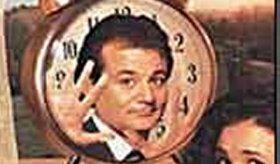|
|
| Tookey's Review |
|
| Pro Reviews |
|
| Mixed Reviews |
|
| Anti Reviews |
|
| Cast |
|
| |
 |
| |
| Released: |
1992 |
| |
|
| Genre: |
FANTASY
ROMANCE
COMEDY
|
| |
|
| Origin: |
US |
| |
|
| Length: |
103 |
|
| |
|
| |
|
|
| |
|
A TV weatherman (Bill Murray) has to relive the same day over and over again, in his least favourite small town in America, on the occasion of the festival he most hates - one on which he has to hand over weather-forecasting duties, because of a local superstition, to an overgrown, underground squirrel. He is cursed - or blessed - with reliving this most demeaning day of his year until he gets it right.
|
Reviewed by Chris Tookey
|
|
|
| Groundhog Day poses a question we all ask ourselves. What would I do if I had my life to live over again? I know I'd do things differently, but would I do them any better? The anti-hero of this movie reverts initially to the traditional pursuits of younger men. Since he doesn't have to care about consequences, he drinks heavily, drives like a maniac, pursues meaningless sex. Growing up a little, he tries to impress the woman he fancies (Andie MacDowell) by pretending they have a lot in common. Maturing still further, he realizes that to win her he must actually improve himself - in his case, by finding new skills (he turns into a demon piano-player) and developing something he has previously found anathema: community spirit. |
| The resulting film of self-redemption owes something to Dickens's novel A Christmas Carol , but more to Frank Capra's masterpiece, It's A Wonderful Life . In both films, the hero begins with so self-centred and restricted a view of his universe that he contemplates suicide. In both, he learns through supernatural intervention that he is part of a wider community, and he comes to appreciate small-town American values. There are, however, dissimilarities. The outcome of It's A Wonderful Life is, in a way, pessimistic: its hero, played by James Stewart, has to learn that his own thwarted personal ambitions are relatively unimportant, and he needs to sacrifice them for the good of his family and community. In Groundhog Day , the message is more upbeat: by improving yourself, you may learn that family and community are more important than career, but there's no reason why you shouldn't have your career as well. |
| All this may sound over-optimistic, and perhaps it is. Americans like to see life as a series of opportunities; Europeans tend to be more cynical and fatalistic. Murray's character is so entertaining when sneering at small-town Americana, popular taste and pushy life-insurance salesman that it's almost a disappointment when he turns into a nice guy who might have voted for A Better Tomorrow With President Clinton. Murray's at his funniest, like his spiritual ancestor W.C.Fields, when being a curmudgeon. |
| But at least Murray has learned to mellow convincingly. At the end of a not dissimilar process in a Hollywood update of A Christmas Carol , Scrooged (1988), he seemed to be sneering at the sentimentality of the script. Maturity has turned Murray into a much more sympathetic comedian. So why was Groundhog Day such a success? Not even excellent performances by Murray could make hits out of his previous two movies, Quick Change and What About Bob? The answer, as so often, lies in the script. Given the highly restrictive premise, the film might have turned out over-repetitive and mechanical but it didn't: a tribute to writer Danny Rubin and his co-writer and director, Harold Ramis. |
| The film is, like a previous "surprise" hit, Ghost , a very clever mixture of genres. Some American critics dismissed Groundhog Day as just another time travel picture, like Back To The Future or The Terminator . But the picture is completely uninterested in the logic or mechanism of time travel. Groundhog Day is more like those rather dated J.B.Priestley plays (Dangerous Corner, I Have Been Here Before ) when time repeats itself without explanation. |
| It is also a middle-aged romantic comedy, like the underrated Frankie and Johnny , where both members of the duo bring their own hopes and insecurities to the party - and a middle-age crisis movie. The Bill Murray we see in the opening scenes is old before his time. He has forgotten how to enjoy himself: he even turns down a date with Andie MacDowell to read a book. As in Spielberg's Hook , he has to find the child - or at least the optimistic young man - within himself. |
| But the aspect which makes Groundhog Day so original and such a huge success is that this is a computer-age comedy. The American critics failed to notice something that will be obvious to most young moviegoers: Murray's character lives his new life just like the hero of an interactive adventure in a computer game. If he dies, he can always go back and make another choice; and he can use knowledge gained beforehand to make more informed choices next time. This was certainly the most ingenious comedy of 1993, and among the funniest and most heart-warming. |
|
|
|
|
